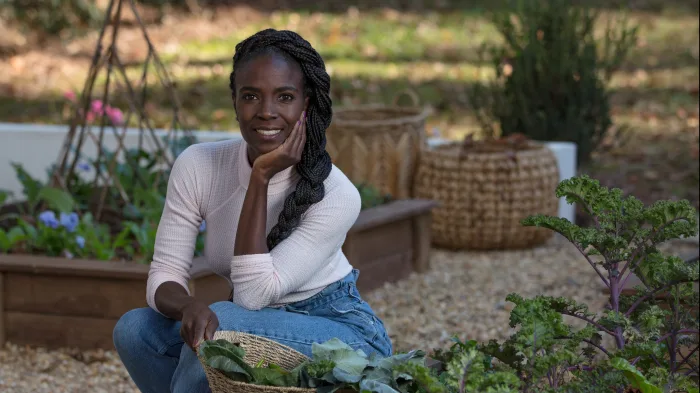Jamila Norman knows farming holds secrets of our past and future
Share
Explore Our Galleries
Breaking News!
Today's news and culture by Black and other reporters in the Black and mainstream media.
Ways to Support ABHM?
By Nylah Burton, Andscape
‘Homegrown’ star talks about food sovereignty and finding inspiration from her family’s farm in Jamaica

Jamila Norman is the star of Homegrown, a Magnolia Network show where Norman helps families start their own gardens for sustenance. She hopes that the lessons she teaches in urban farming will have a ripple effect on the surrounding community.
An environmental engineer by trade, Norman pivoted to farming in 2010 when she and her business partner, Chef Beee, started Patchwork City Farms in Atlanta.
She became an environmental engineer because she wanted to solve sustainability and climate problems, and farming is no different. “Atlanta has a lot of bad air quality. So having that lush green helps to contribute to positive air quality. Farming in the city was also a way where we were able to divert a lot of wood chips and compost, things that would’ve gone to landfills.”
She said, “Farming wasn’t just about addressing one thing, but creating an ecosystem of health and wellness.” Norman’s father is from Trinidad, and her mother grew up on their family farm in Jamaica, where Norman’s great-grandmother made coconut oil and her great-grandfather raised bulls. “I have reverence for how my great-grandparents lived their lives — living off of the earth.
“One of the things I came across in the community that I moved into in Atlanta was access to fresh food. Access to fresh food was practically nonexistent. There was lots of fast food, lots of corner stores, all that,” Norman said. “I saw an opportunity to take an unused space in the city and use that to grow food, utilizing that space in a green and sustainable way.”
Andscape describes Norman’s project.
AirBnB created a program that connects people with Black history. Some people view farming’s roots in liberation.









Comments Are Welcome
Note: We moderate submissions in order to create a space for meaningful dialogue, a space where museum visitors – adults and youth –– can exchange informed, thoughtful, and relevant comments that add value to our exhibits.
Racial slurs, personal attacks, obscenity, profanity, and SHOUTING do not meet the above standard. Such comments are posted in the exhibit Hateful Speech. Commercial promotions, impersonations, and incoherent comments likewise fail to meet our goals, so will not be posted. Submissions longer than 120 words will be shortened.
See our full Comments Policy here.